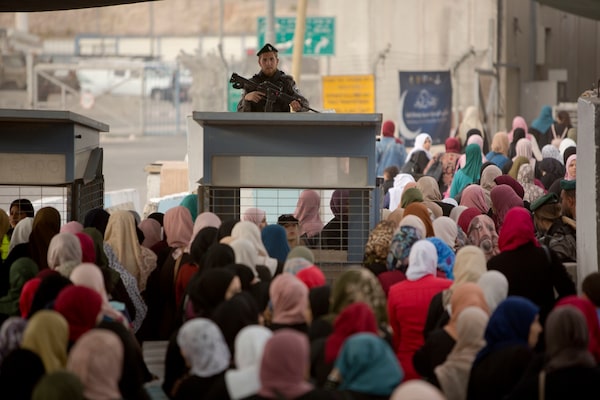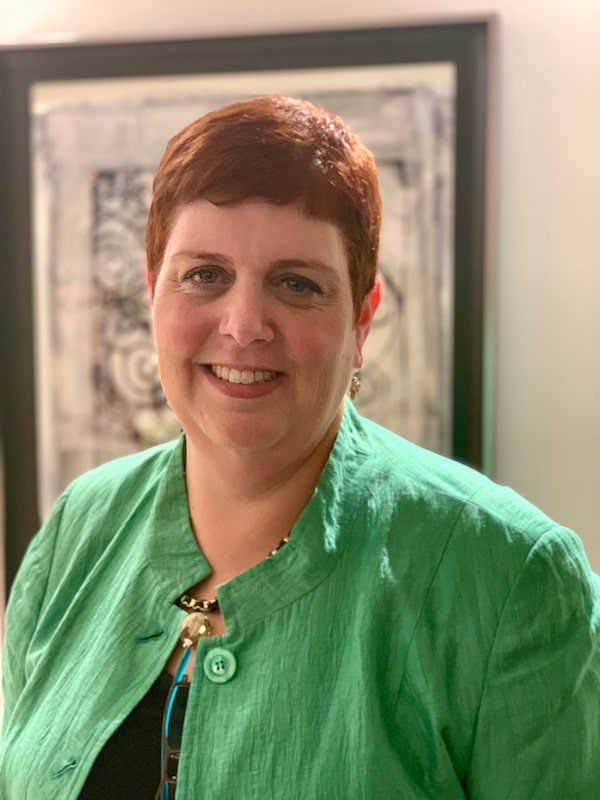
Palestinian women make their way through the Qalandia checkpoint, between the West Bank city of Ramallah and Jerusalem. Checkpoints are just one of the obstacles facing Palestinians seeking superior Israeli health care, something that non-profit organization Project Rozana is seeking to remedy.Majdi Mohammed/The Associated Press
The path to peace between Israelis and Palestinians is eternally precarious, but while high-level negotiators seem to struggle and stumble, some Canadian organizations are looking to grassroots efforts — and even medical attention — to bring ordinary people together.
For example:
- Each year, a program called Heart to Heart brings together 20 youth who are citizens of Israel — 10 of them Jewish and 10 Palestinian — for an intensive summer camp experience near Perth, Ont. In addition to doing regular summer camp activities, the youths live together and participate in relationship building activities and facilitated dialogue about the narratives, politics, and power dynamics that shape their daily lives back home.
- The Canadian Association of Jews and Muslims (CAJM) has been working since 1996 to bring people from the two faiths together. Its stated objectives are “to learn, understand and jointly work together, in order to promote harmony between Canadian Muslims and Jews.” The group says it has ramped up its activities since Sept. 11, 2001, to fight hate crimes, discrimination, anti-Semitism and Islamophobia.
- A group called Peace It Together has run three-month programs in Western Canada with 10 Israeli, 10 Palestinian and 10 Canadian youth leaders. The youth take part in an intensive summer program and make short films that offer perspectives from all sides of the conflict.
- Canadians help support a community called Neve Shalom/Wahat al-Salaam (Oasis of Peace) where Israelis and Palestinians with Israeli citizenship have chosen to live and raise their children together. (Palestinians who live within the pre-1967 Six Day War borders of Israel are entitled to Israeli citizenship.)
A group of Canadians is also active in supporting an Israeli-Palestinian medical program which transcends the tense borders and checkpoints that form the Green Line between Israel and the West Bank and Gaza called Project Rozana. This program brings Israeli and Palestinian medical teams together to help anyone in the region who needs acute or emergency healthcare, no matter what or whose side they are on.
It also funds the training of Palestinian doctors, nurses and therapists in Israel, to improve and expand healthcare in Palestinian communities.

Project Rozana volunteer Sargit Arbel-Alon is an Iraeli obstetrician, gynecologist and a poet.
Recently, two of its leading participants, Drs. Sargit Arbel-Alon and Akram Amro, visited Canada to build support and raise funds for the program. Their visit included a session with MPs from all parties, who hold conflicting views on solutions to Middle East peace.
Dr. Arbel-Alon and Dr. Amro are co-workers, as volunteers.
“We don’t talk about peace, we practice it,” says Dr. Amro.
Dr. Arbel-Alon is an obstetrician, gynecologist and a poet, and as Israeli as they come — the granddaughter of Holocaust survivors, the daughter of a high-ranking military officer and a former Israeli Supreme Court justice.

Project Rozana volunteer Akram Amro is Palestinian, a resident of Hebron. He heads the physiotherapy department at Al-Quds University and is an expert on stroke research.
Dr. Amro is Palestinian, a resident of Hebron, which is a frequent flashpoint for conflict. He heads the physiotherapy department at Al-Quds University and is an expert on stroke research.
The not-for-profit and resolutely non-political Project Rozana started in 2013. It is named after Rozana Salawhi, a Palestinian girl who fell from the ninth floor of her apartment when she was four and needed life-saving medical attention.
Her mother insisted that she be transferred across the military border to Israel’s Hadassah Medical Centre in Jerusalem, because she considered the facilities and treatment more reliable. Rozana recovered from her fall and survived.
Travelling through a checkpoint across the Green Line from Ramallah to Jerusalem — a 21-kilometre ride — is not like driving to Buffalo from Toronto for chicken wings.
It can take hours of searches, questioning and waiting for a Palestinian to cross into Israel — time that patients like Rozana and others can’t afford when they are critically ill or need services such as dialysis.
Project Rozana seeks to cut through all the hostility, misunderstanding and red tape by focusing on where Palestinians and Israelis can work together. To date, the project, founded by Australian venture capitalist and philanthropist Ron Finkel, has raised more than $1-million. Project Rozana Canada is among the international groups that help raise funds for the project.
When Dr. Arbel-Alon and Dr. Amro visited Ottawa, they met with eight MPs — four of them pro-Israeli and four pro-Palestinian.
“We told them how we focus on three main areas — training, transport and treatment,” Dr. Amro explains.
For instance, the project provides financial support for Palestinian doctors, nurses and therapists to gain advanced training in Israeli facilities.
A side effect is to build long-term professional relationships between Israeli and Palestinian doctors and medical teams.
Transportation is just as important to Palestinians in dire need of medical help, Dr. Amro adds. It is difficult for them to even get to the border, and once in Israel, they cannot necessarily afford transportation to the hospital.
So Project Rozana has partnered with another Israeli not-for-profit group, Road to Recovery, which deploys more than 1,000 Israeli volunteers who meet Palestinians at the border and drive them to hospitals and doctors for free, day or night.
Treatment is free for Palestinians who rely on Project Rozana, mainly children with emergency or ongoing complex medical needs. The project also funds “patient navigators” who speak Arabic and provide psychological assistance and aftercare for patients who require extended stays.
“One of the benefits of our program is that we get to know each other as people, instead of the enemy,” Dr. Arbel-Alon says.
Both Dr. Arbel-Alon and Dr. Amro agree that in addition to treating patients, the program lets Israelis meet Palestinians who are successful, educated and anxious to build better lives for their children. Palestinians meet Israelis who aren’t just occupiers, but volunteer drivers and doctors and nurses who care.
Indeed, in 2013, Dr. Arbel-Alon, a prize-winning poet, dedicated one of her poems to another physician, Palestinian Yousuf Shatat. The Hebron-based emergency-room doctor had pleaded with border guards to allow his 12-year-old daughter Ireen to be rushed to Israel for emergency treatment — unlike Rozana, she didn’t survive.
“You know, in Project Rozana we talk about training, transport and treatment, but for me there’s a fourth ‘T’. It’s Tikkun Olam, which is the Jewish concept of making the world a better place,” Dr. Arbel-Alon says.